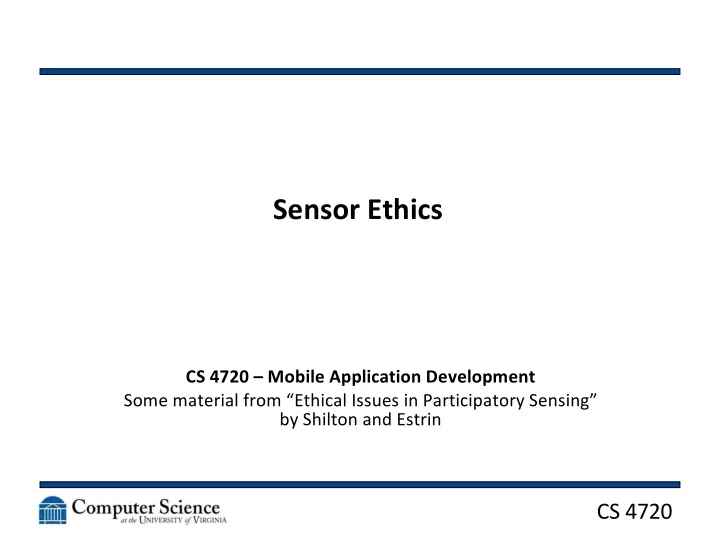

Sensor Ethics CS 4720 – Mobile Application Development Some material from “Ethical Issues in Participatory Sensing” by Shilton and Estrin CS 4720
What are sensors? • We loosely define a sensor as anything that can detect information about the state of the device in the world around it – Sounds – Light (and vision) – Movement – Temperature / Humidity / Barometric Pressure – Specialized (heartbeats, for example) CS 4720 2
Where do we use sensors? • Sensors originally were all specialized micro- devices (and some not so micro…) • Each had their own API, custom hardware, etc. • It was a giganitic pain to get them to play together to do anything interesting • (This has changed in recent years with the advent of wireless sensor networks and Internet of Things...) CS 4720 3
Where do we use sensors? • These sensors were often used in major construction installations – Bridges – Dams – Oil Rigs • Used for monitoring lots of big things that people couldn’t always get to • Also by the military CS 4720 4
Smartphone: Game Changer • Everything changed with the smartphone • Now you had one device with a BUNCH of sensors – Camera – Microphone – Accelerometer – GPS – Sometimes more! • And all with one unified API! And cheap! CS 4720 5
Smartphone: Game Changer • This has led to a whole new way we think about computing – Persistent sensing – Wearable computing – eHealth • But has introduced several new challenges CS 4720 6
Sensor Usage Considerations • GPS is the easiest sensor to come up with gray areas of usage • Camera and Microphone are probably second and third • But what about others? CS 4720 7
When to Shake? • The accelerometer doesn’t have as many ethical issues, but does have UX problems • When do you want to use it? • When should you reconsider? • Why? • How does this affect accessibility? • Physical interface is NOT cut and dry! CS 4720 8
Storing and Transmitting Data • What are you doing with the sensor data when you collect it? – Is it only local, or is it transmitted to a server? – Does it contain personally identifiable information? – Is the data classified as protected in some way? (medical, education, etc.) – Is the data encrypted? – How long is the data stored? CS 4720 9
Ethical Concerns • Privacy: control over personal information • Consent: informed consent to participate in data collection • Equity: fairness and justice in how individuals are treated • Social forgetting: purposeful discarding of information to enable forgiveness and a clean slate CS 4720 10
Ethical Concerns • When does the benefit gained by utilizing sensors and gathering data outweigh any concerns for privacy, consent, equity, and social forgetting? • Who makes that call? CS 4720 11
Scenario #1 • A young man is struggling to find a treatment plan for his depression. He believes his current medication dose is ineffective, but his doctor tells him his lack of progress is due to poor sleeping habits and medication non-adherence. The patient begins a self-monitoring program which generates new traces of his daily activities, sleep patterns, and medicine adherence. The phone records a combination of GPS and accelerometer readings to compare his daily activity levels. The device learns the time he wakes up and sends him a sleep quality survey. It also sends medication reminders at the proper time of day, and allows him to enter assertions that he’s taken the medication. The phone sends all of this data—a record of his locations throughout the day as well as sensitive information about his health—to a server to draw inferences requested by the doctor or the patient, and guide discussions with his doctor and adjustments to his care plan. CS 4720 12
Scenario #2 • A mixed-income community in Los Angeles planning a community revitalization project. Community organizers help residents download software on their mobile phones. With the user’s permission, the phones record GPS traces to document participants’ routes to school and work. The phones also use location-based surveys to ask residents about the availability of healthy eating options, gathering places for youth, as well as less desirable aspects of the community like safety hazards and poor housing conditions. At the end of the data collection period, the community group uses annotated maps of community members’ daily routines to contribute to a healthy community plan. CS 4720 13
Scenario #3 • A parent is worried about her child walking home by themselves from school everyday. The parent turns on location tracking on their child’s phone without telling the child because she is afraid he will be embarrassed. The parent can check the child’s location whenever she wants on her own phone or at any web browser. CS 4720 14
Scenario #4 • A map app you voluntarily installed on your phone sends anonymous location data along with every one of your search requests. When you search for food nearby, stores that have paid the company a premium to have their results at the top also utilize your previous search history to send you customized coupons and specific directions to their closest location with your search results. CS 4720 15
Scenario #5 • You have amazing technical prowess and have written a program that can utilize every mobile phone camera and microphone to search the city for a terrorist during a time of crisis. The terrorist may or may not be in clown makeup. CS 4720 16
Recommend
More recommend